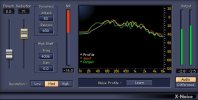Chuck P
Inspired
So, the topic of the hour seems to be noise management. With the Beta thread and the Recto-and-also-noise-gate thread thoroughly derailed, I figured I would start a new thread to start a more focused discussion.
A lot of the "noise gate" conversation isn't really about noise gates, right? A noise gate opens when you're playing and closes when you're not, so there is no noise allowed through between notes. What people on the board are mostly talking about is a filter of some sort that reduces the noise while playing, effectively increasing the signal-to-noise ratio. You can do this with a notch EQ (and accept the impact on the tone), or presumably there are other "smarter" algorithms. I guess these try to analyze the noise between notes and intelligently "subtract" that from the tone, or something?
I feel like if we got a much better noise gate, it would not address a lot of the concerns being expressed.
A lot of the "noise gate" conversation isn't really about noise gates, right? A noise gate opens when you're playing and closes when you're not, so there is no noise allowed through between notes. What people on the board are mostly talking about is a filter of some sort that reduces the noise while playing, effectively increasing the signal-to-noise ratio. You can do this with a notch EQ (and accept the impact on the tone), or presumably there are other "smarter" algorithms. I guess these try to analyze the noise between notes and intelligently "subtract" that from the tone, or something?
I feel like if we got a much better noise gate, it would not address a lot of the concerns being expressed.

